Wednesday, April 16, 2014
1938-39 Boston Bruins Roy Conacher Jersey
Beginning his career with the West Toronto Nationals of the Ontario Hockey Association in 1933-34, Roy Conacher and the Nationals would capture the Memorial Cup in 1936. Conacher would then join the Toronto Dominos in senior hockey in 1936-37 before joining the Kirkland Lake Hargreaves for 1937-38, where he had a fine season, scoring 12 goals and 23 points in 14 games.
Roy Conacher while with the Dominoes
That fine season led to him making his NHL debut the following season of 1938-39 with the Boston Bruins, where he established himself with a league leading 26 goals and 37 points in 47 games, good for second on he club behind only linemate and future Hall of Famer Bill Cowley as the Bruins finished atop the NHL standings with a 36-10-2 record for 74 points, 16 ahead of the second place New York Rangers. Conacher was the last rookie to lead the league in goals until Teemu Selanne 54 years later!
During the odd playoff format of the era, Boston immediately faced the Rangers in a best-of-seven series for an immediate berth in the Stanley Cup Finals, while the second and third place teams faced off with the winner meeting the survivor of the fourth place vs. fifth place club, all best-of-three series.
Boston won the first game against the Rangers in New York after 59:25 of overtime, just 35 second short of two complete games, setting the tone for what would be a most difficult series for both clubs.
Boston won another overtime game at home in Game 2 after 8:24 of extra time before a relatively easy 4-1 win in Game 3. The series moved back to New York, where the Rangers won a narrow 2-1 win. Back in Boston for Game 5, the Rangers won another 2-1 game, this one requiring 17:19 of overtime.
The Rangers then evened the series at 3-3 after having lost the first three games when they took a 3-1 win in New York, setting up a Game 7 in Boston.
In yet another 2-1 game, the fourth of the series and fifth one goal game, Boston survived after 48 minutes of overtime, the fourth game to extend beyond regulation time.
The Toronto Maple Leafs advanced to face the Bruins in the finals after defeating the New York Americans and the Detroit Red Wings, which they accomplished so quickly that they had an extras day's rest despite having to play in two series spread out over three cities. In fact, Toronto had played in just five games with an additional 5 minutes of overtime, while the Bruins needed seven games plus an additional 133 minutes of overtime, the equivalent of over two additional games of play!
The 1939 Stanley Cup Finals began in Boston on April 6th, a game won by Bobby Bauer of Boston with a goal with 4 1/2 minutes remaining for a 1-0 series lead. Game 2 on the 9th went to the visiting Maple Leafs in overtime before the series moved to Toronto for Game 3 on April 11th.
There was no scoring through the first two periods before Bauer got Boston on the board at 1:28 followed by Conacher at 8:12. Jack Crawford extended the Bruins lead to 3-0 and when Gus Marker got one by Frank Brimsek with just 49 seconds remaining to spoil the shutout, it made Conacher's goal the game winner.
Boston went up 3 games to 1 when Brimsek shut out the Maple Leafs as Conacher scored both Bruins goals, the first coming at 2:21 of the first period on the powerplay, which gave him his second game winning goal in as many games. His second goal came at 12:55 of the third period to give the Bruins some additional breathing room.
It was back to Boston for Game 5 and the Bruins broke out on top with Mel Hill's goal from Conacher and Cowley at 11:40 with a man advantage only to have Toronto even the score at 18:40 of the first with Bingo Kampman's goal at 18:40.
The only goal of the second period was by Conacher, from Cowley and Eddie Shore at 17:54. Brimsek then held the Maple Leafs at bay throughout the third period while Flash Hollett added a late goal with just 37 seconds left in the game to make the final margin 3-1 as the Bruins captured the Stanley Cup thanks to the rookie Conacher's third consecutive game winning goal on this date in 1939, making him the first player to ever score three straight game winning goals in one playoff series, let alone the finals.
The 1939 Stanley Cup champion Boston Bruins
Conacher finished second in playoff scoring for the Bruins with 6 goals and 4 assists for 10 points, trailing only Cowley's 3 goals and 11 assists.
Conacher would go on to play three more seasons for the Bruins, including winning a second Stanley Cup in 1941 before his career was interrupted like so many others by World War II from 1942-43 to 1944-45, during which time he did compete for a number of Royal Canadian Air Force teams on a limited basis.
Roy during his later years with the Bruins
He returned to the NHL with the Bruins for 4 regular season and 3 playoff games in 1945-46 before being traded to Detroit for 1946-47 when the Bruins' Art Ross had his doubts that Conacher could regain his previous form. In his only season in Detroit, Conacher posted the only 30 goal season of his career on his way to 54 points in 60 games while becoming the answer to a trivia question, as he wore #9 with Detroit during Gordie Howe's rookie season as Howe wore #17. During that season Conacher had a career best four goals in a single game, all of them assisted by Billy Taylor, who set an NHL record with 7 assists that night.
After just one season with Detroit, following a dispute over his pay, Conacher was traded to the Chicago Black Hawks where he would play the final five seasons of his career, reeling off consistent seasons of 22, 26, 25 and 26 goals before an abbreviated final season in 1951-52.
Roy while with the Chicago Black Hawks
He would finish his career with 490 games played, 226 goals and 200 assists for 426 points and a pair of Stanley Cups and an Art Ross Trophy, won in 1949 while with Chicago when he totaled a career best 68 points in 60 games while teamed with playmakers Bill Mosienko and Doug Bentley, ironically winning a trophy for scoring excellence named after the very same man who doubted his!
Roy was inducted into the Hockey Hall of Fame in 1998, joining his older brothers Charlie (1961) and Lionel (1994) as the only trio of brothers currently in the Hall of Fame.
Hall of Famers Charlie and Lionel Conacher flanking Roy's twin brother Bert
Today's featured jersey is a 1938-39 Boston Bruins Roy Conacher jersey as worn by the rookie Conacher when he scored the game winning goal in three consecutive games to lead the Bruins to the Stanley Cup.
The Bruins debuted this sweater style in 1936-37 before the term "sports marketing" had been invented, choosing to feature a large player number on the front of their jerseys instead of any sort of logo in what looked more like an NFL football jersey.
The numbers would reverse colors in 1940-41 and would remain that way until the 1948-49 season when the famous "spoked B" would be seen for the first time.
Today's video segment is an interesting look at what hockey was like back in 1939 when Conacher was a rookie.
Labels:
Boston Bruins,
Conacher Roy
Subscribe to:
Post Comments (Atom)


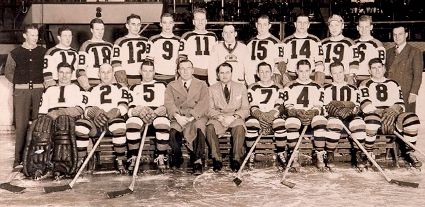
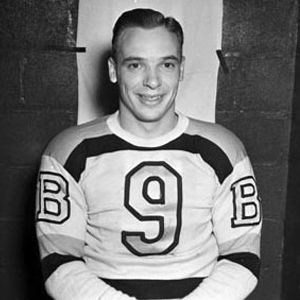
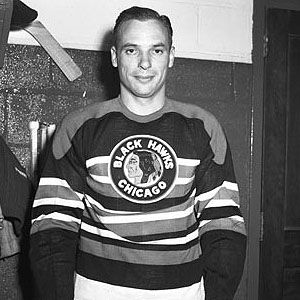
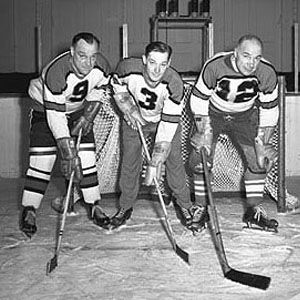
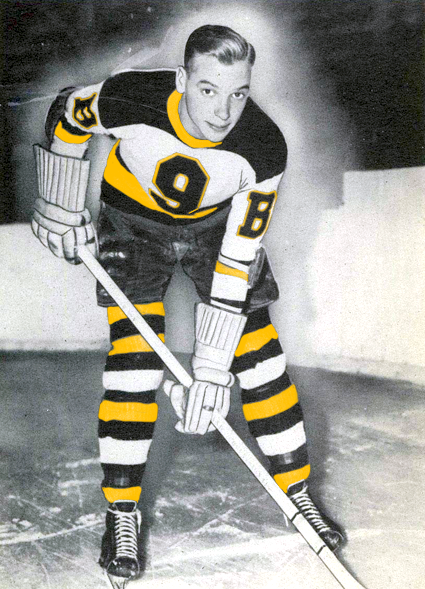










No comments:
Post a Comment
We welcome and encourage genuine comments and corrections from our readers. Please no spam. It will not be approved and never seen.